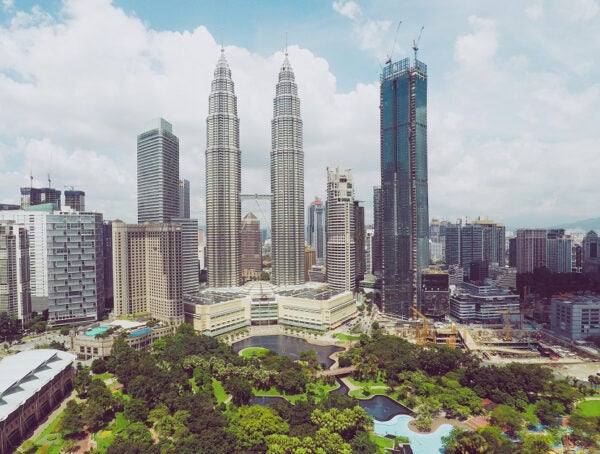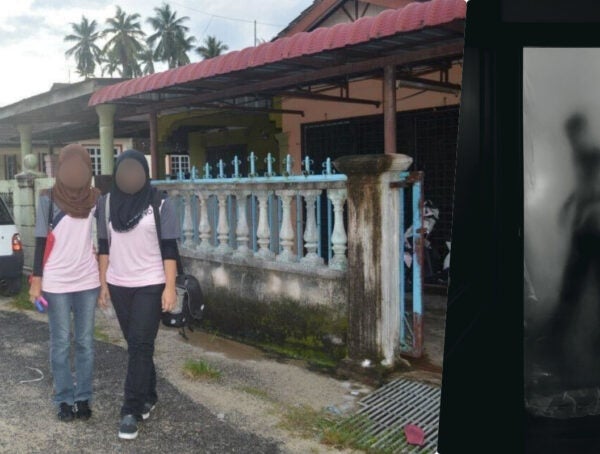Disclaimer: In Real Life is a platform for everyday people to share their experiences and voices. All articles are personal stories and do not necessarily echo In Real Life’s sentiments.
Subscribe to our Telegram for updates.
There are many beauty products sold on online marketplaces, but not all of them are legitimate products. This is a story by an ex-founder of a discontinued cosmetics brand who wanted to raise awareness about businesses which create fake cosmetic products to scam innocent buyers.
On 2nd May 2023, Facebook user Emma Harshaw Fx, wrote a viral post with over 100k likes and 17k shares.
In her post, she shared her personal experience of starting a business in 2016 with the guidance of a “Founder’s Community”.
Emma’s dream was to start an honest cosmetics business in Malaysia. But instead, she was taught by this Founder’s Community to sell poor quality products that scammed buyers using fake claims.
This is her story.
Emma was invited to be part of a ‘Founder’s Community’ group
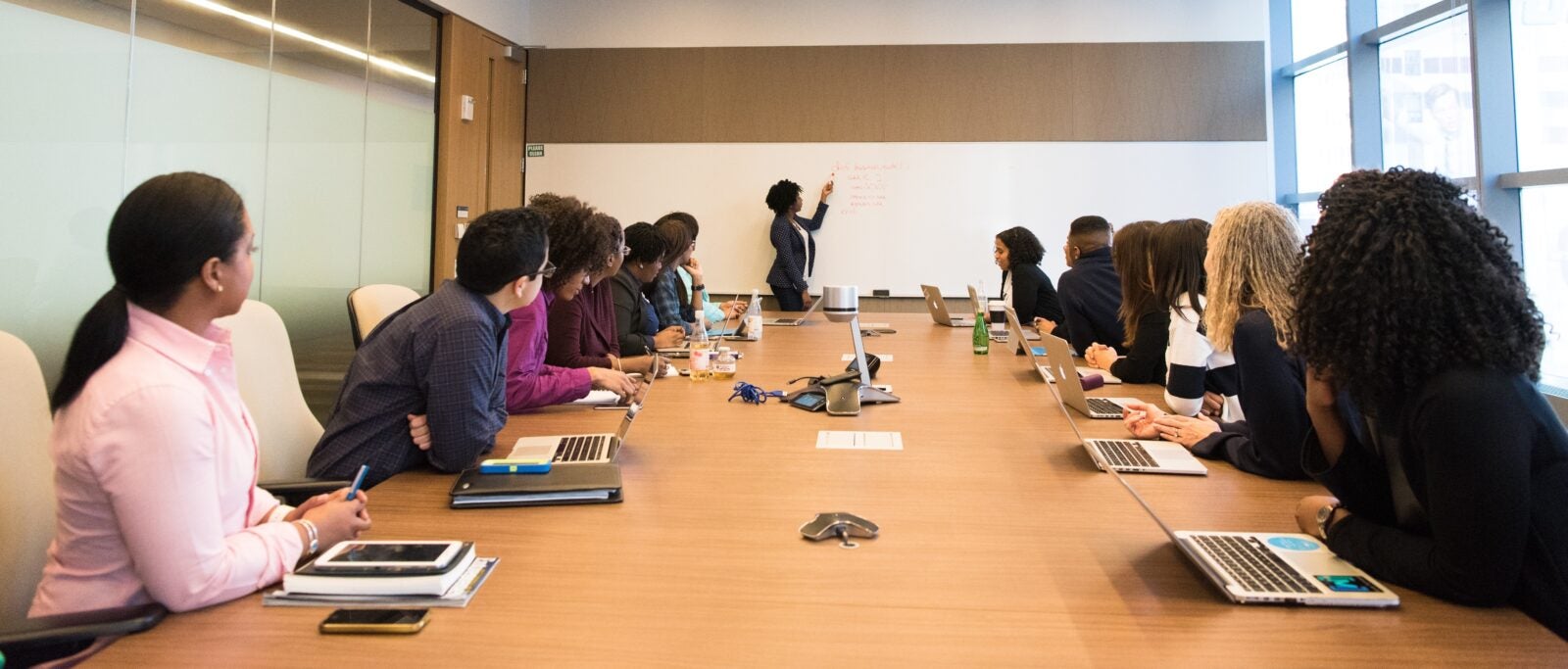
For illustration purposes only. Image via Pexel.
In 2016, Emma was invited by a friend to join what was known as a “founder community” based in Kelantan.
They wanted her to be part of their operations because they thought she was good-looking enough to become successful.
“If you’ve ever seen that one video of business ‘founders’ gathering for an OOTD photoshoot at a house floating around the internet, that was the gang,” she said. However, she declined to name which specific founder’s community it was.
After making her introduction, Emma went searching for the services of a factory to begin manufacturing her product.
Emma’s plan was to sell face cream at a retail price of RM30.00 per unit. She went around the various factories in Klang Valley to sample a list of various scents and textures.
Emma visited a factory in Old Klang Road to look for scents and textures
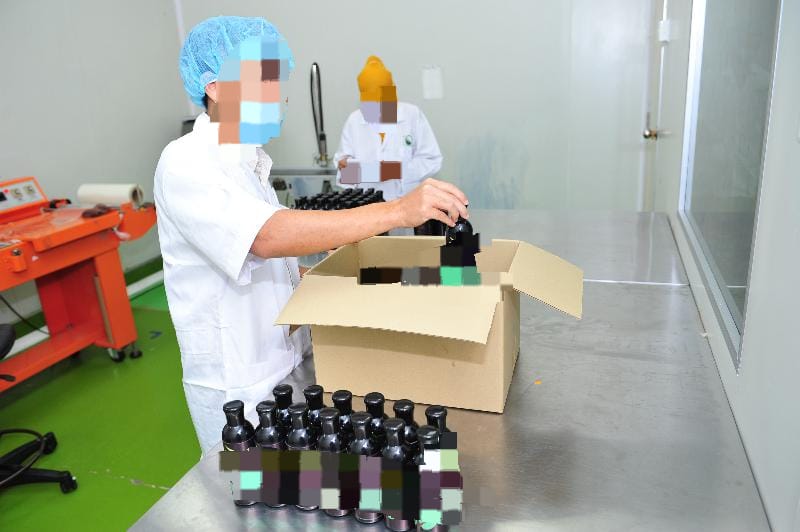
For illustration purposes only. Image via Twitter.
Emma heard of a factory on Jalan Klang Lama that was famous for supplying pomade (hair gel), so she paid it a visit.
At the factory, she spotted many products on the assembly line which were sold by famous global celebrities and millionaires.
“I had assumed these celebs owned their own factories, but it turned out that they were also using our Malaysian OEMs,” she shared.
In Malaysia, only Original Equipment Manufacturer (OEM) cosmetic factories follow Good Manufacturing Practices (GMP). These are located mainly in Kelantan, Kedah, Selangor, and Perak.
In developed countries, a food or drug may be deemed “adulterated” if it is found to be manufactured in a facility which does not comply with current GMP.
There are two types of factory: One is licensed and has GMP status. “The other is a self-made OEM factory that buys machines on Alibaba,” explained Emma.
The factory gave Emma a list of scents and textures to sample. The minimum order quantity was 500 pcs, costing RM 10.80 per unit, and the factory would handle obtaining the N.O.T. KKM for the product.
The N.O.T. refers to the product reference code of a cosmetic product that was issued by the Health Ministry of Malaysia (KKM), according to Semakan.my.
Founders use shady unregulated factories that produce “Timbang Kilo” products
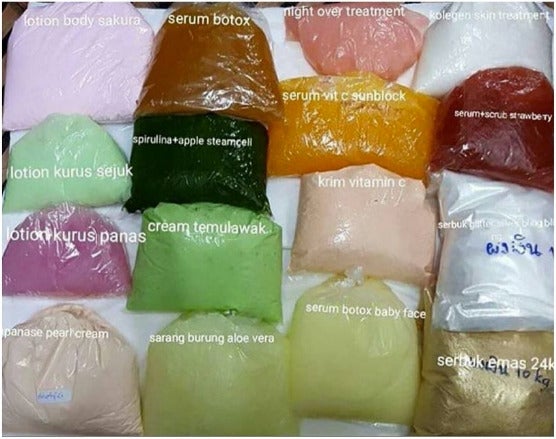 Image via Emma Harshaw FX on Facebook.
Image via Emma Harshaw FX on Facebook.
At the time, non-GMP accredited factories could be found across the border, in Thailand.
“The products made from these factories were known as “Timbang Kilo” (fake weighing scale products) because of their poor quality” Emma shared.
Some founder community members suggested to Emma: “Why not get products from a Thai factory instead?”
For a Thai “Timbang Kilo” factory, the initial cost of production would be quoted at RM 3.40 per unit, which was much cheaper than RM10.80.
Meanwhile, the business owner would have to take on the process of registering the product with KKM herself.
However, Emma was hesitant to use a Thai factory.
She recalled how there was a founder who was busted by the authorities for selling a product that contained mercury.
“It was because they manufactured their products at one of these Timbang Kilo factories,” Emma said.
So Emma chose to use the factory on Jalan Klang Lama as she was based in Klang Valley.
‘Founders’ rent out luxury cars and houses to post on social media
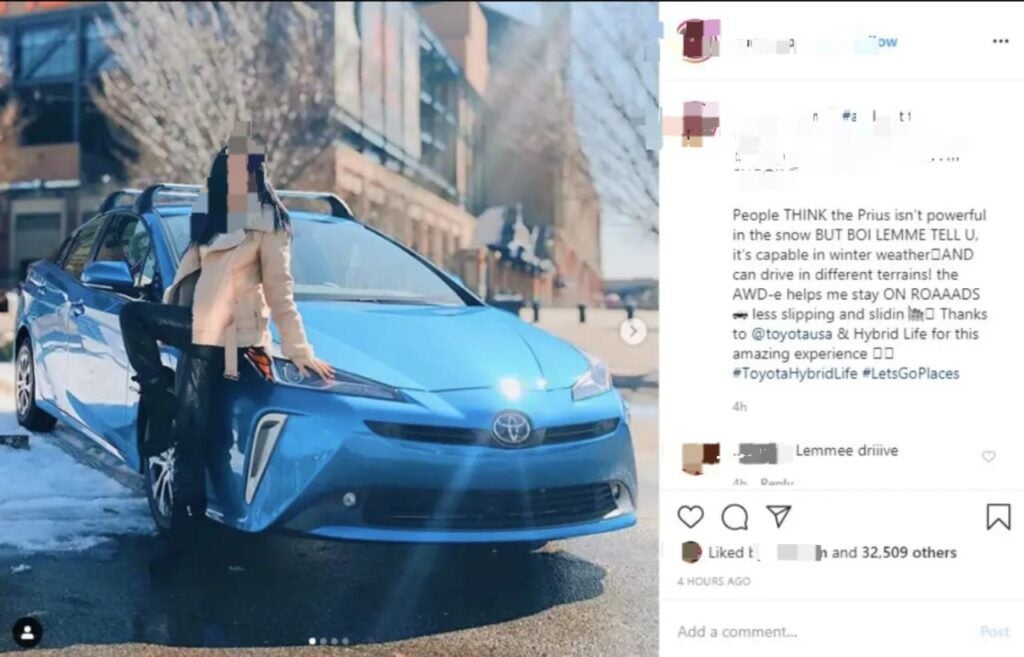
For illustration purposes only. Image via Google Images.
When it came to marketing, there was a lot of smoke and mirrors involved to over-exaggerate the perceived premium quality of the product.
Emma was taught to build up a fake personal brand on Facebook and Instagram by posting pictures of luxury cars and houses on her accounts.
“Some founders owned super luxurious cars that they would lend to us for marketing purposes. We could choose any car,” she revealed.
Once chosen, the founder’s community would change the owner’s name to the new owner’s name temporarily, and then they would “interchange” the number plate. They would even give it a new spray colour of the new “owner’s” choice.
The rental period would be between 3 months to a year, with no extra fee charged. Instead, the original owners would take a percentage of the profit for the entire rental period.
“If you wanted to look successful, you’d buy the car because nobody wanted to be labelled as a scammer. Imagine if you suddenly show up with a 3rd gen Myvi with oil filter problems. It would be embarrassing.” Emma said.
For those who failed to get the required number of sales, the luxury cars will be returned.
Apart from cars, founders would also rent luxury houses in Kelantan for marketing purposes only.
Emma says she only rented one of the houses for 3 days. In that time, she took thousands of pictures over a span of several days in different outfits.
“We would post the pictures intermittently on social media to make it look like I genuinely lived in that luxury house,” Emma shared.
Founders used “Agents” to create fake reviews and fake product tactics
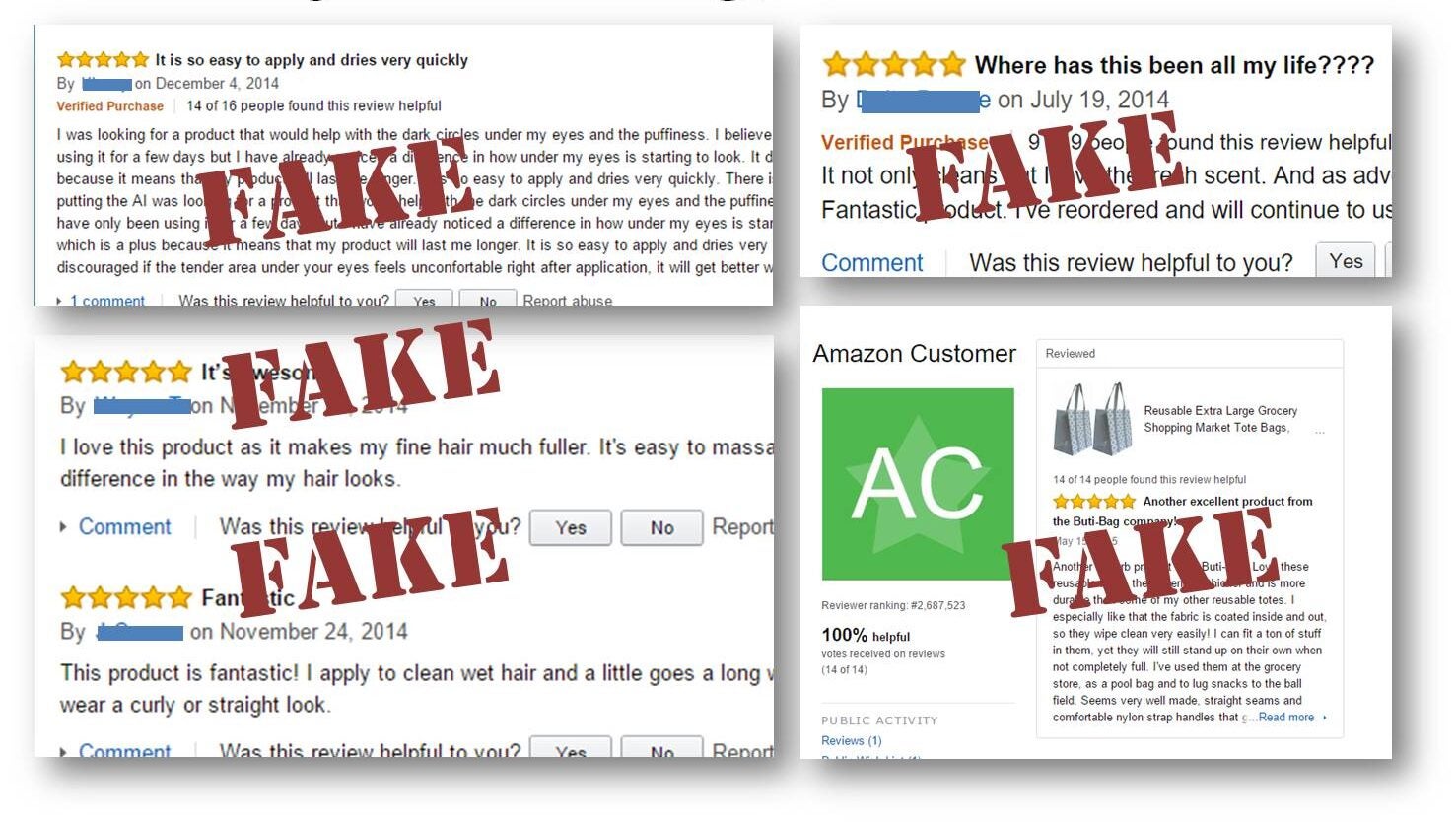
For illustration purposes only. Image via Amazon.
Next, the Founder’s Community advised her to use their network of “agents” who would create fake 5-star reviews of her product.
They shared with Emma a database with a list of agents who were working for them. To access this database, she had to pay a small fee of around RM 5,000.
“I managed to sell 6000 units in just a week, but I sold them all through agents.” Emma shared.
The initial product cost was around RM 15,000, the minimum marketing spend was RM 30,000, including car and house rental and Facebook/Instagram ads, and with the agent fee, that came up to RM50,000 in capital.
Emma took out a loan of RM 40,000 on top of spending RM 10,000 from her own savings. Then the founders community helped boost her product’s visibility and orders started coming in.
After the first batch of products is sold out, many people would usually complain that it is ineffective and damages their skin.
“This is where the Fake Product Tactics come in,” Emma shared.
Founders will make a second batch and start propaganda stating that the old bottles were fake, made by third party scammers, and not the real product that Emma was endorsing.
The smart ones would even start using the GMP OEM factory to make the real products to cover up the fact that the first batch was fake.
In truth, there was no third party scammer, nobody else would fake their products except the founders themselves!
And buyers are deceived into buying the second batch.
“They are tricked twice. Is this what you call smart business?” Emma asked rhetorically.
Emma earned RM40,000 from the very first sales cycle
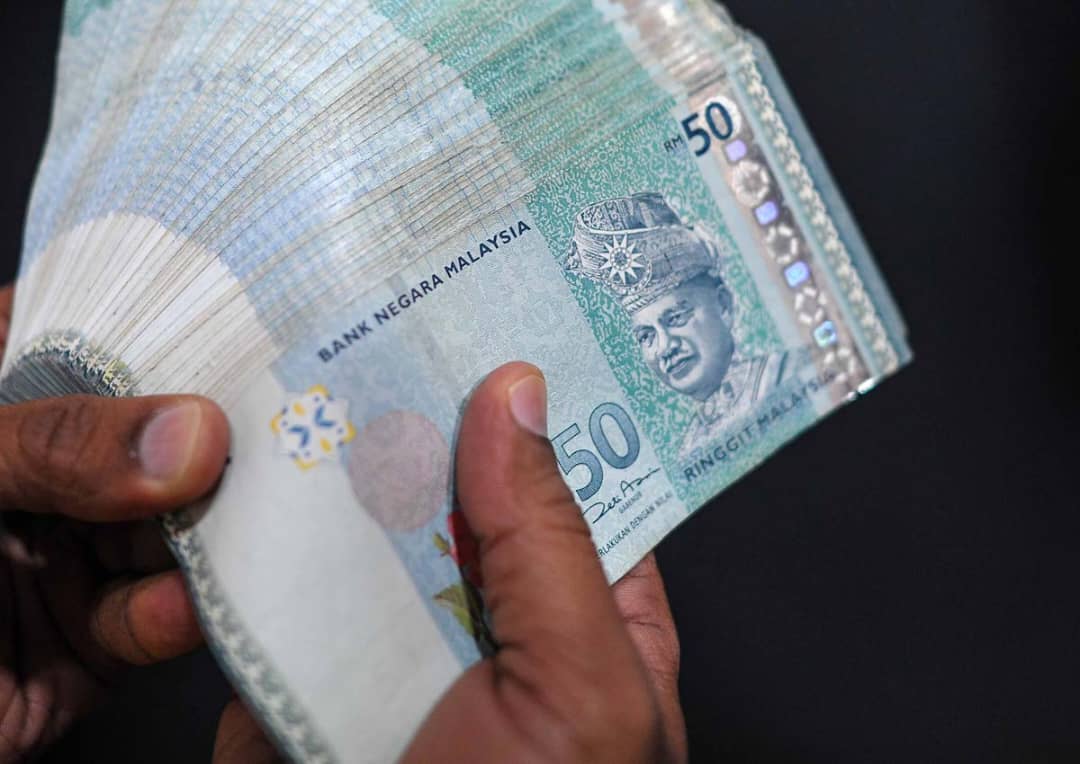
For illustration purposes only. Image via Unsplash
After the first sales cycle was over, Emma shared how much she earned.
“I earned RM 12 profit per unit, so the gross profit was RM 90,000. After subtracting the RM 50,000 I put in, the net profit was RM 40,000.” For a few months worth of “work”, Emma earned more than some people’s annual salary.
According to Emma, if she had used a factory in Thailand instead, her net profit would have been even greater — it would have been to the tune of RM 100k-200k.
Founders who use the GMP OEM factory have very little profit, around 20% only, not including marketing costs. In comparison, founders who use the Fake OEM and Timbang Kilo factory can earn up to 1000% profit.
“They can sell a bottle that costs RM1 for RM60,” revealed Emma.
As such, founders who manufactured their products in Thailand can easily become millionaires within just 2-3 sales cycles.
Emma felt so guilty that she stopped all business operations.
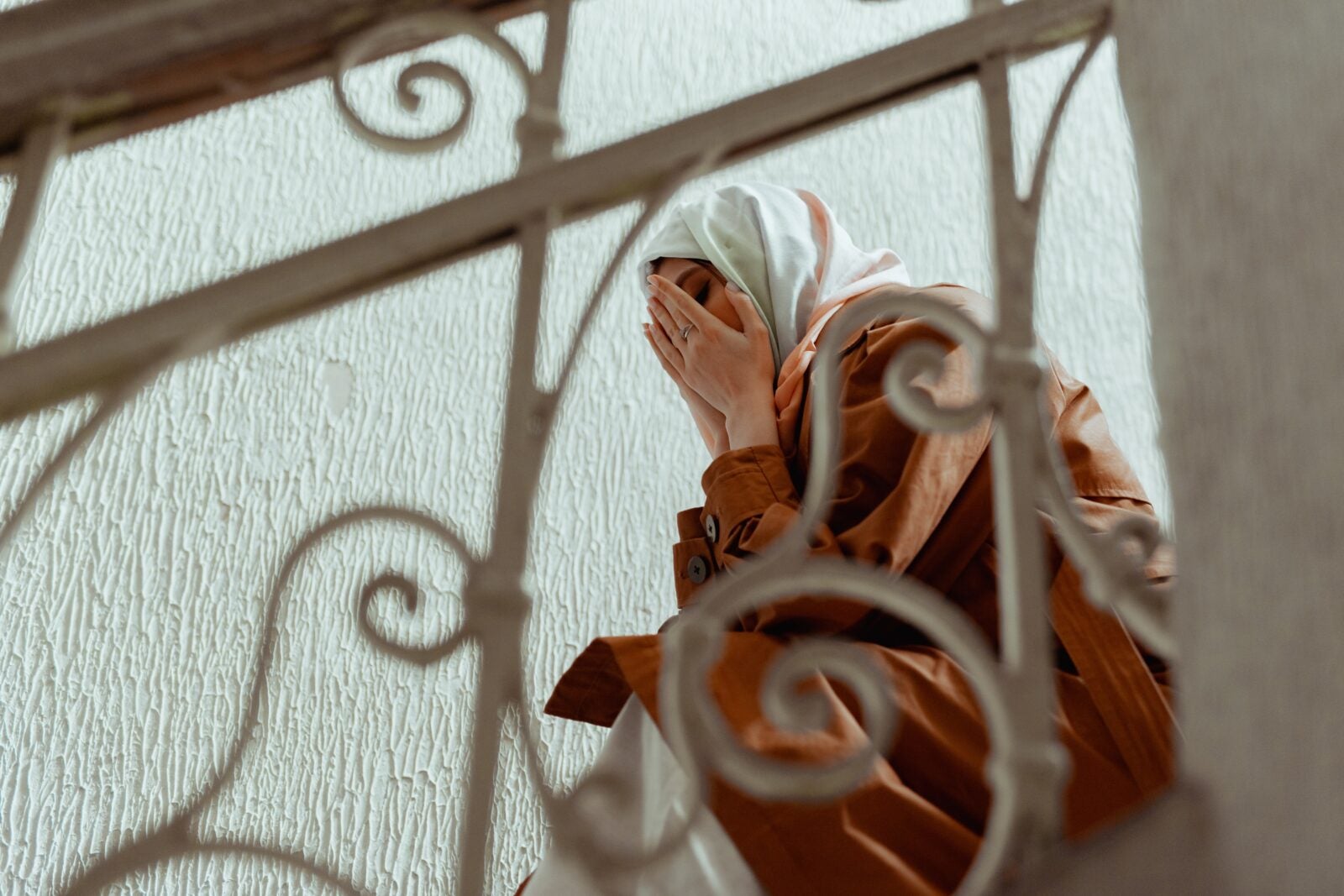
For illustration purposes only. Image via Unsplash
“Since I started off my business with deceitful methods, I felt so guilty that I couldn’t bear to continue with my business.” Emma shared.
So after just one sales cycle, Emma stopped operations completely.
After Emma closed shop, many agents complained that they couldn’t sell the remaining products because she stopped being active on Instagram and had stopped uploading any new pictures of the products.
In the end, Emma distributed her profits evenly among all her agents and paid off her loan in full. She didn’t keep a single cent for herself.
Her reasoning was that, “Whenever I spent that money, I didn’t feel like I had earned it through honest means.”
Some other founders, after finding success in the first sales cycle, also ceased their operations and used their profits to open restaurants, electronics stores, and other legit businesses.
“However, their success began with deceit,” said Emma. “When you start with deceit, you have to cover it up with more deceit too.”
4 Fake Product Tactics That The Founders Community Use
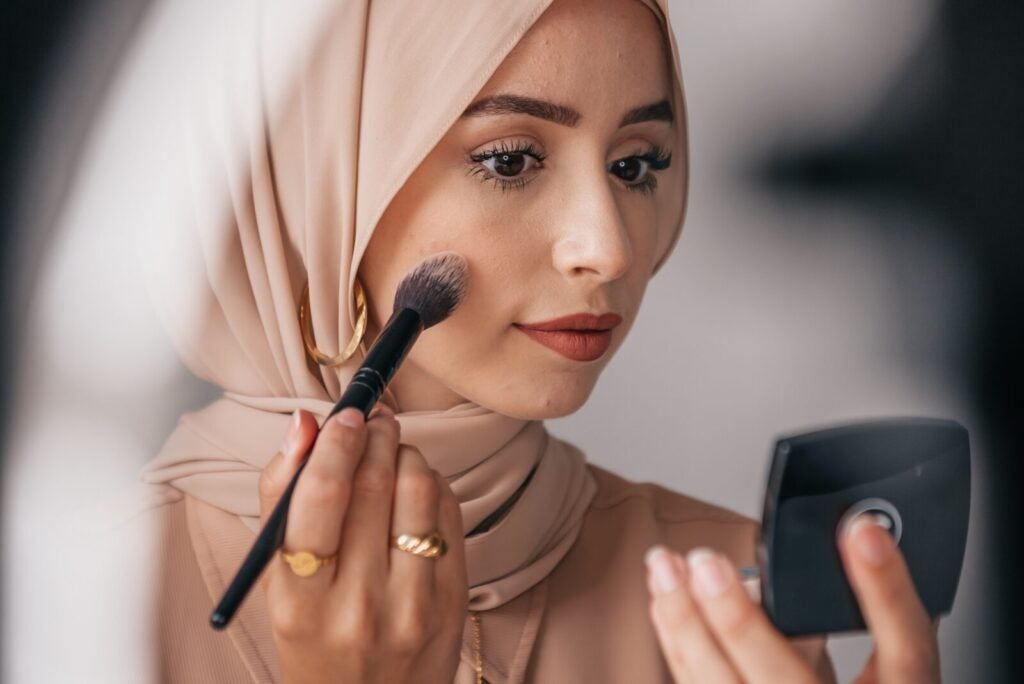
For illustration purposes only. Image via Unsplash
Here are some of the shady marketing gimmicks that the founder community employed to generate sales:
- Pretend to own a luxury car.
“This fraud can be concealed because the car is registered under my name and the license plate has been changed,” said Emma.
- Write fake reviews.
“We created fake reviews along with other agents and founders. We just exchanged reviews, but many agent reviews were fraudulent, and they shared them among themselves. At that time, there were about 40-50 agents in Malaysia.” said Emma.
- Pretend to own a luxury house.
“Everything was just a facade. I took hundreds of pictures and uploaded them to Instagram intermittently as advised by other founders. I stopped uploading because I felt very guilty every time I did,” said Emma.
- Submit the product for KKM approval but sell a different product.
“I didn’t do this one, but my mistake was not speaking up about it,” said Emma.
Many Timbang Kilo products on the market were marketed as “approved by KKM”. It’s because they submit one product for testing but would sell something else.
After Emma posted her story on Facebook, she faced both support and threats from internet users
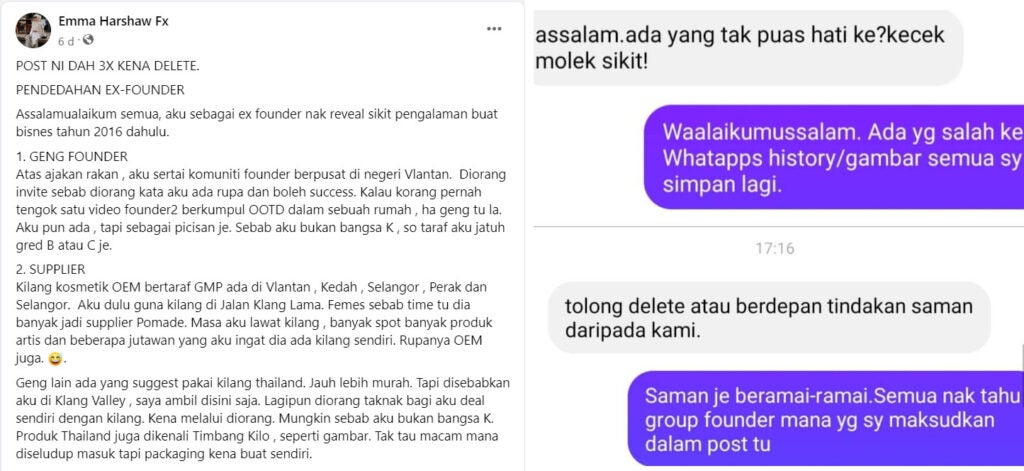
Screenshot taken from Emma Harshaw on Facebook.
The post has been shared over 17,000 times with more than 100,000 reactions.
There has also been backlash to the post. Emma received threats from some users to take down the post, it has been reported by anonymous parties up to 3 times, and marked as hate speech twice.
But after many users have independently verified the issue, Facebook restored the original post.
Emma stands firm on her choice to publish this info publicly on her social media. She wrote a follow-up post, published on Sunday, 7th May 2023, saying “Nak saman boleh saman berama-ramai ye.”
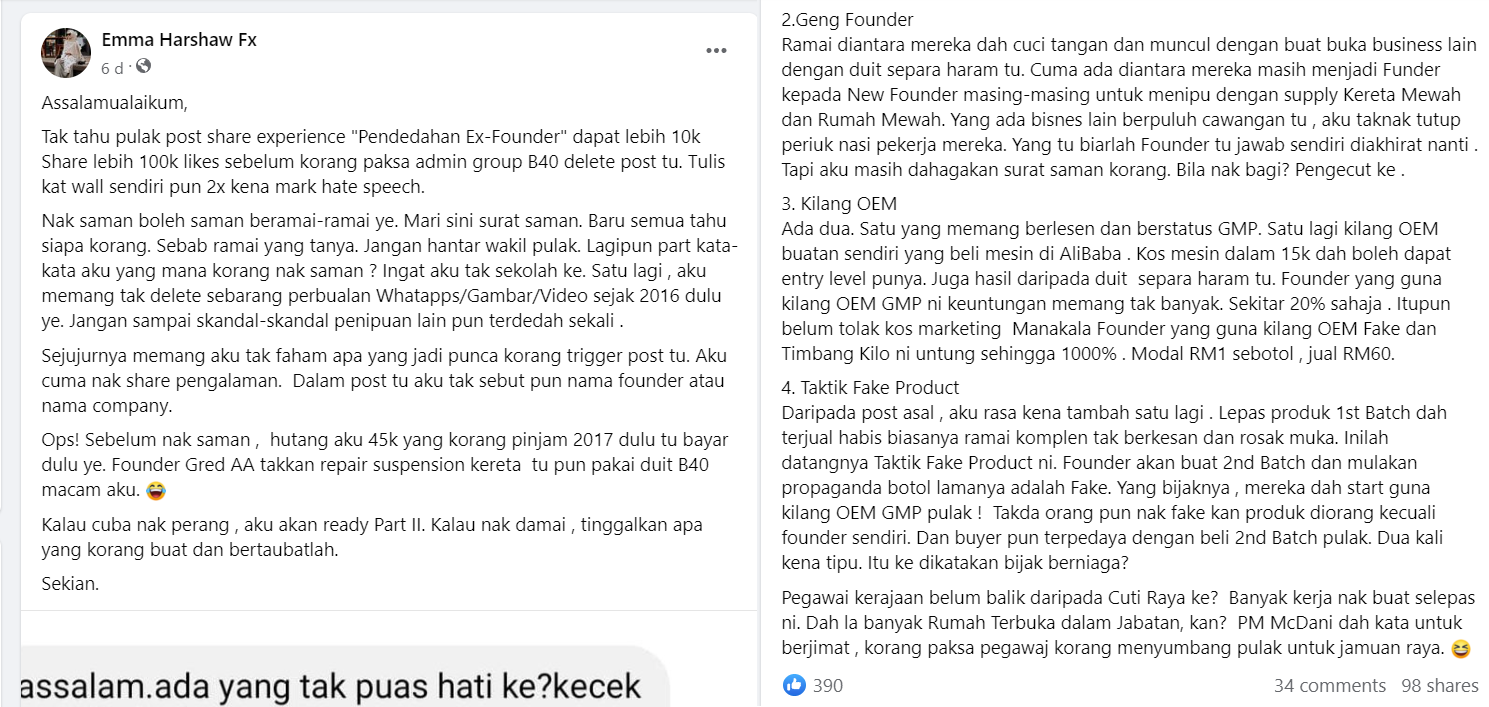
Screenshot via Emma Harshaw on Facebook.
In English, it translates to: “If you want to sue, you can sue me together. Let’s see who you really are. Many people have asked me about this. Besides, which words of mine do you want to sue me for? Don’t forget that I have not deleted any WhatsApp conversations, pictures or videos since 2016. Otherwise, other scam scandals might also be exposed.”
Emma mentioned that she just wanted to share her personal experience, and she didn’t mention the name of the founder or the company, so she wonders who is being triggered by her words.
Lastly, she mentions that before suing her, the aggrieved parties should pay back the RM 45k that they borrowed from her in 2017.
“I hope KKM can increase their efforts to crack down on this fraud. This is one of the biggest frauds committed by the founder community,” said Emma.
4 Ways to Avoid Being Tricked By Fake Products Online
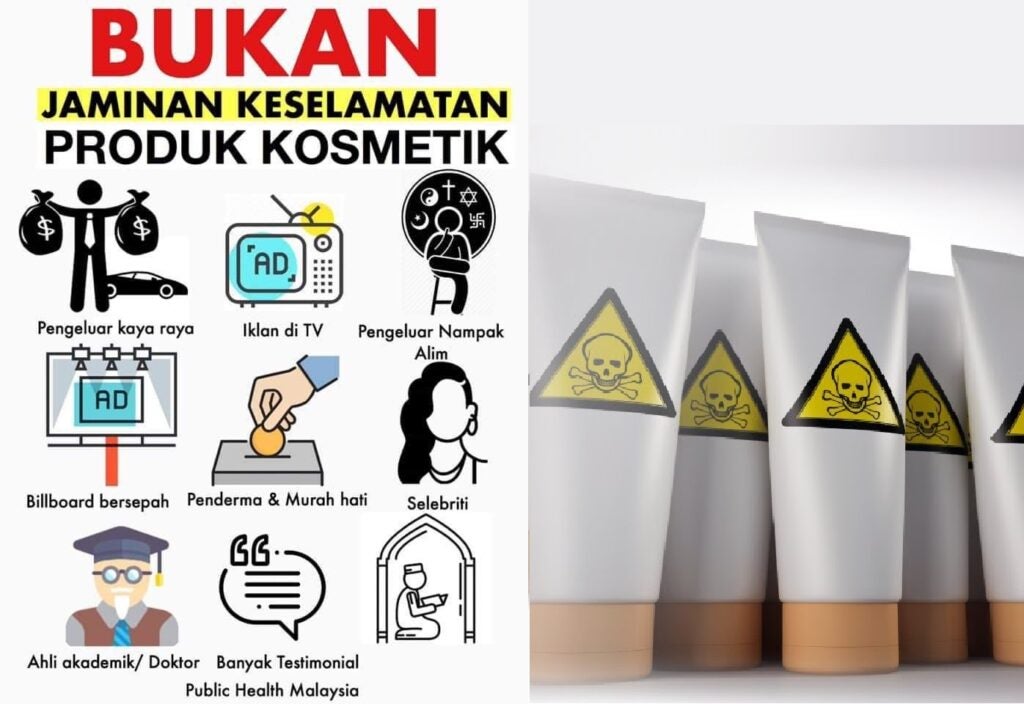
Here are a few ways to avoid being tricked by such fake products:
1.Only buy cosmetics from licensed pharmacies
Buy from retail stores like Watson, Guardian, or D’Apotic pharmacies. They can only stock products that follow the GMP (Goods Manufacturing Practices). They cannot stock fake products as they will lose their license if found to do so.
2.Don’t just rely on 5 star reviews online
Still buying online? Don’t just rely on the 5 star reviews, read the 1 and 2 star reviews as well. Check if there are words like “scammer” or “fake product” in the reviews. When buying a product online, there’s always a risk that it’s fake or has a defect.
3.Research the product’s reputation on multiple channels
Use Google search to check: Does it have a website? Does it have a Wikipedia entry? Are there product reviews in well-known magazines? Are news sites covering its stock in the business section? As a general rule, the more coverage the product has, the more reputable it is.
4.Get the professional opinion of a doctor
Get a second opinion from a medical professional. Show it to your trusted doctor or pharmacist and ask them to read the ingredient label. They can tell you if it’s missing a specific industry qualification such as the GMP or if it has a substance that is harmful to the body (such as mercury).
Be careful when buying beauty products from online sellers. In the online marketplace, there are no real and enforceable regulations, it’s “buyer beware”.
Do you have a personal story? Email us at ym.efillaerni@olleh
For more stories like this, read: https://inreallife.my/beware-5-most-common-online-scams-malaysians-still-fall-for-in-2023/
You might also like
More from Real Skills
How I Saved Almost RM50,000 On Buying My First Car
Here's how this Malaysian man with a RM3,500 salary saved RM50,000 on his first car.
Angry M’sian Boss Demands Unpaid Overtime Over Raya, Causes 9 Staff To Quit
An anonymous employee at a local SME shares how a bad-tempered boss eventually caused 9 staff to quit before Hari …
I Studied In Chinese School As A Malay Boy, Here’s What I Learnt
Every time I used Mandarin outside of school, family members would come up to me at gatherings and ask me …






